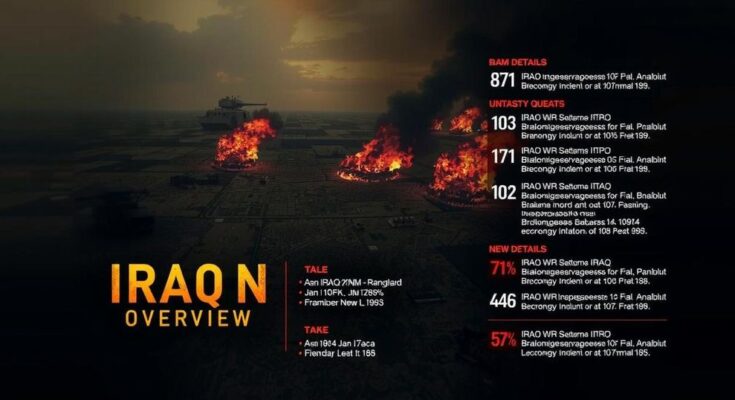The Iraq War (2003-2011) was a conflict initiated by the U.S.-led invasion of Iraq, resulting in the swift defeat of Iraqi military forces and subsequent insurgency against the occupation. It resulted in significant American casualties and concluded with a formal withdrawal of troops by the end of 2011.
The Iraq War, occurring between March 2003 and December 2011, comprises two distinct phases. The initial phase witnessed a rapid military engagement during March and April 2003 when a coalition led by the United States and the United Kingdom, alongside smaller forces from various nations, invaded Iraq. This operation resulted in a swift defeat of Iraqi military and paramilitary units. However, the subsequent phase saw the emergence of an insurgency opposed to the U.S.-led occupation, leading to persistent conflict throughout Iraq. Violence levels began to diminish markedly in 2007, allowing the United States to gradually reduce its military presence, culminating in a completed withdrawal by December 2011. The conflict incurred significant human costs, with approximately 4,500 U.S. service members killed and around 32,000 wounded. To understand the Iraq War’s onset, it is pivotal to consider its historical backdrop. Iraq’s invasion of Kuwait in 1990 catalyzed the U.S.-led coalition’s response in the Persian Gulf War, ultimately leading to Iraq’s defeat. Following this conflict, President Saddam Hussein maintained power through brutal suppression of dissent, notably against the Kurdish and Shiʿi populations. The international community, particularly the United Nations, imposed economic sanctions on Iraq to prevent the development of weapons of mass destruction. Despite UN inspections revealing prohibited arms, Iraq’s non-compliance with these resolutions exacerbated tensions with the United States. In 2002, amid growing concerns over Iraq’s alleged possession of weapons of mass destruction and potential links to terrorist groups, U.S. President George W. Bush called for renewed scrutiny of Iraq. A UN resolution demanding the reinstatement of weapons inspectors followed. The complexity of international relations was evident, as several countries advocated for prolonged inspections, highlighting divisions among global leaders. Ultimately, the stalemate and perceived non-compliance led President Bush to declare an end to diplomatic efforts, resulting in the invasion commencing on March 20, 2003. The initial military campaign initiated with aerial bombardments targeting key Iraqi installation sites, facilitating the ground invasion. Following initial successful operations, concerns about resistance from Iraqi forces prompted the coalition to encounter sporadic, disorganized opposition from remnants of the Baʿath Party and irregular forces. U.S. forces captured Baghdad on April 9, 2003, marking a significant milestone in the campaign’s success. In the wake of major combat operations, the focus shifted towards stabilizing Iraq, yet this period saw significant resistance and growing insurgency, complicating the post-war landscape.
The Iraq War was shaped significantly by the historical context of Iraq’s previous conflict with the United States and the actions of Saddam Hussein’s regime. Following Iraq’s invasion of Kuwait, the resultant Persian Gulf War culminated in stringent international sanctions aimed at curbing the nation’s military capabilities, notably its alleged weapons of mass destruction. Over the years, increasing tensions between Iraq and the United States led to the eventual decision to invade, fueled by the atmosphere of post-9/11 security concerns and the desire to eliminate perceived threats.
In summary, the Iraq War emerged from a complex interplay of historical grievances, international relations, and security concerns following the September 11 attacks. With the initial military victory succeeded by a protracted insurgency and occupation, the conflict significantly affected Iraq and broader Middle Eastern dynamics. Ultimately, the withdrawal of U.S. forces in December 2011 marked the end of a tumultuous chapter in the region’s history, though the implications of the war continue to resonate significantly today.
Original Source: www.britannica.com




